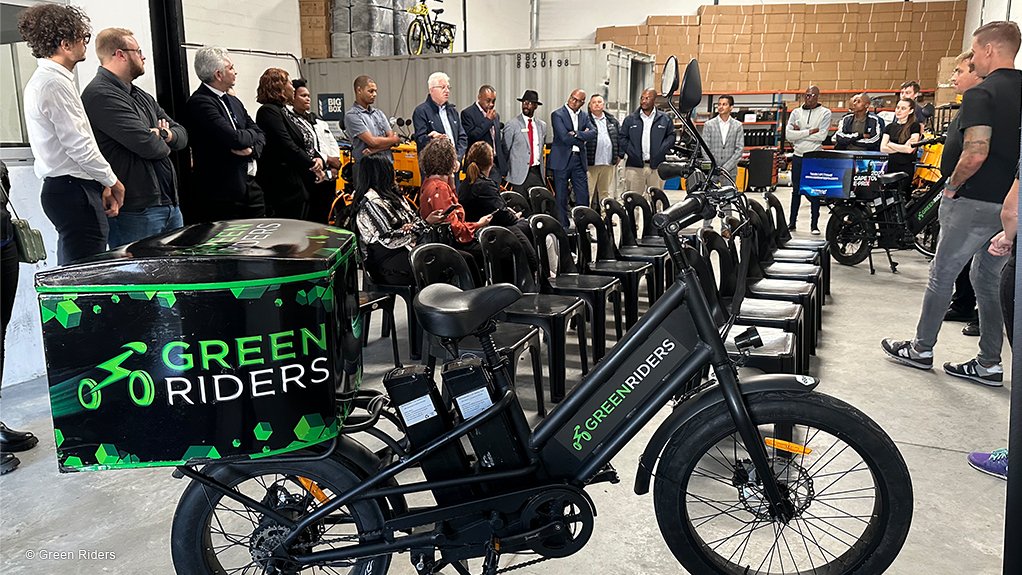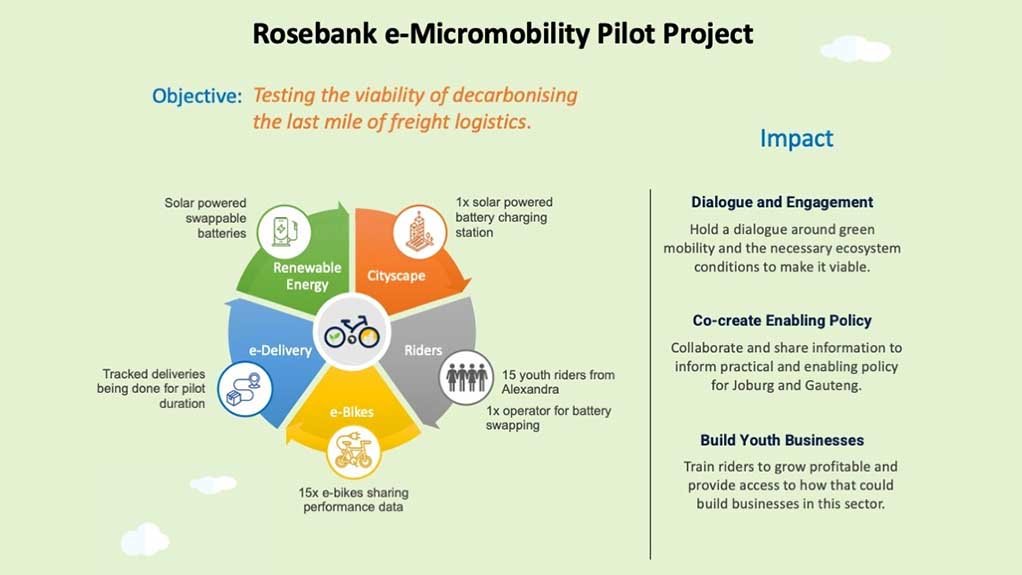Rosebank project set to test viability of e-bike last-mile delivery system
CityConsolidator Africa (CityCon Africa) has launched the Rosebank e-Micro Mobility Pilot Project, a public-private partnership that will deploy 15 electric bikes in the Rosebank Management District (RMD) precinct as last-mile delivery vehicles.
The programme will train, use and rotate 20 riders, typically jobless youths.
The bikes are set to share a solar-powered charging kiosk that will double as a battery-swapping centre, says CityCon Africa CEO Andile Skosana.
“On-the-ground deliveries are almost ready to go,” he adds.
“There are some bottlenecks in the renewables supply chain and one or two technical issues to iron out as we prepare for implementation.
“We expect to have the pilot coming to an end around Transport Month – October, 2023.”
Skosana says the aim is for the pilot project to answer questions around how an electric bike ecosystem operates and how it can be replicated in the rest of Johannesburg and other cities.
“This should be a benchmark case study documenting the components of a working ecosystem for decarbonising last-mile deliveries in Johannesburg. We don’t have a relevant and contemporary African point of reference.”
“Gauging the performance of the pilot study will generate insights into e-bike and rider performance, delivery metrics, carbon savings and much more,” he adds.
“The study will include a submission to support the Transport Authority Gauteng’s (TAG’s) 2030 Smart Mobility strategy; a concept note on a green mobility credentials ecosystem; another around universal standards for a battery swapping ecosystem; and a fourth specifically aimed at precinct infrastructure and management protocols for e-micro mobility.”
Skosana admits that the pilot study may be a challenging project, owing largely to South Africans’ disregard for cyclists and motorbike riders.
“South Africa’s roads are built for cars and trucks. It would be no exaggeration to proclaim that they are currently unsafe for e-bikes.
“However, this is where we are, not where we want to be. It should not be that one 75 kg person starts up a two-ton internal combustion vehicle to travel 3 km to buy a litre of milk.
“Two-wheelers take up less space, they are more environmentally friendly, more manoeuvrable, more cost-effective and ultimately quicker, because of their convenience,” notes Skosana.
“They are also more inclusive in bringing more people into mobility generally. Introduced sustainably, an e-micro mobility ecosystem will make for friendlier streets.”
Since Covid-19, e-commerce has skyrocketed and will grow by 40% through 2025, adds Skosana.
“This is one of the only growing segments in the economy now, and yet there is policy silence around the use of delivery e-bikes in cities.
“There needs to be rigorous thinking and planning around influencing policy-making for the sector, because we can shape the growth of the sector to deliver convenience to other parts of the city and even the townships.”
The Partners
The private sector-led e-bike project has the support of the RMD, TAG, City of Johannesburg, the Johannesburg Roads Agency and the Smart Cities office.
The Gauteng Department of Economic Development helped in sourcing riders from Alexandra.
Private sector participation includes second-life storage battery business REVOV, SeeSayDo, SolidGreen, Mzansi Aerospace Technologies, and also Evo Motors and Green Riders, which will be providing the e-bikes.
The typical range of an e-bike, operating with pedal-assist, is between 80 km and 120 km on a single charge.
Each bike has two batteries, with each battery weighing under 3 kg.
“We are constructing a custom solar-powered e-bike battery charging kiosk that has 20 compartments and 40 electrical points,” says Skosana.
“This is because different e-bikes require different charging points and voltages.”
Skosana says pedal-assist e-bikes do not require a licence to operate in South Africa.
Article Enquiry
Email Article
Save Article
Feedback
To advertise email advertising@creamermedia.co.za or click here
Press Office
Announcements
What's On
Subscribe to improve your user experience...
Option 1 (equivalent of R125 a month):
Receive a weekly copy of Creamer Media's Engineering News & Mining Weekly magazine
(print copy for those in South Africa and e-magazine for those outside of South Africa)
Receive daily email newsletters
Access to full search results
Access archive of magazine back copies
Access to Projects in Progress
Access to ONE Research Report of your choice in PDF format
Option 2 (equivalent of R375 a month):
All benefits from Option 1
PLUS
Access to Creamer Media's Research Channel Africa for ALL Research Reports, in PDF format, on various industrial and mining sectors
including Electricity; Water; Energy Transition; Hydrogen; Roads, Rail and Ports; Coal; Gold; Platinum; Battery Metals; etc.
Already a subscriber?
Forgotten your password?
Receive weekly copy of Creamer Media's Engineering News & Mining Weekly magazine (print copy for those in South Africa and e-magazine for those outside of South Africa)
➕
Recieve daily email newsletters
➕
Access to full search results
➕
Access archive of magazine back copies
➕
Access to Projects in Progress
➕
Access to ONE Research Report of your choice in PDF format
RESEARCH CHANNEL AFRICA
R4500 (equivalent of R375 a month)
SUBSCRIBEAll benefits from Option 1
➕
Access to Creamer Media's Research Channel Africa for ALL Research Reports on various industrial and mining sectors, in PDF format, including on:
Electricity
➕
Water
➕
Energy Transition
➕
Hydrogen
➕
Roads, Rail and Ports
➕
Coal
➕
Gold
➕
Platinum
➕
Battery Metals
➕
etc.
Receive all benefits from Option 1 or Option 2 delivered to numerous people at your company
➕
Multiple User names and Passwords for simultaneous log-ins
➕
Intranet integration access to all in your organisation

























